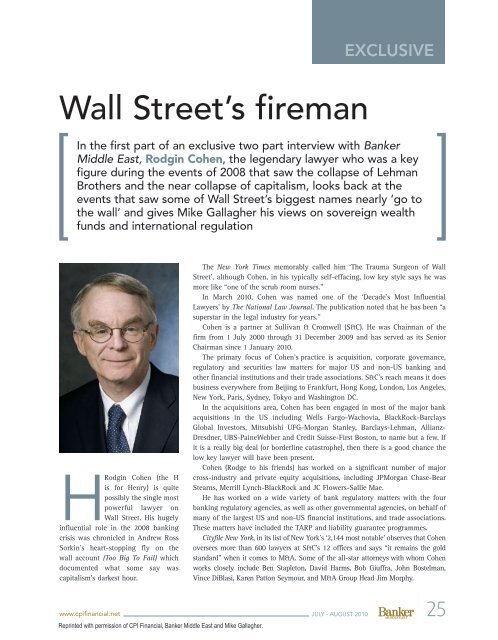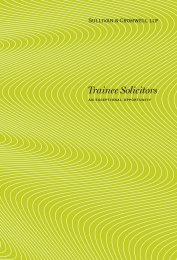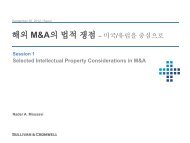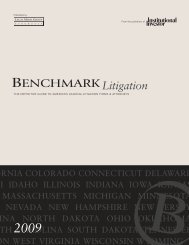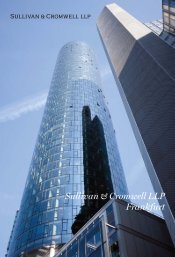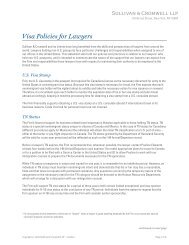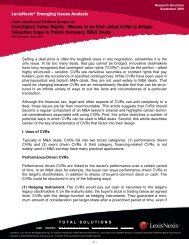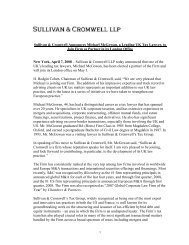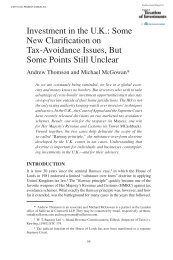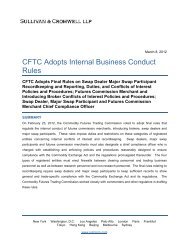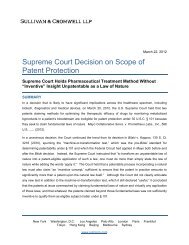here - Sullivan & Cromwell
here - Sullivan & Cromwell
here - Sullivan & Cromwell
You also want an ePaper? Increase the reach of your titles
YUMPU automatically turns print PDFs into web optimized ePapers that Google loves.
EXCLUSIVE<br />
Wall Street’s fireman<br />
In the first part of an exclusive two part interview with Banker<br />
Middle East, Rodgin Cohen, the legendary lawyer who was a key<br />
figure during the events of 2008 that saw the collapse of Lehman<br />
Brothers and the near collapse of capitalism, looks back at the<br />
events that saw some of Wall Street’s biggest names nearly ‘go to<br />
the wall’ and gives Mike Gallagher his views on sovereign wealth<br />
funds and international regulation<br />
H<br />
Rodgin Cohen (the H<br />
is for Henry) is quite<br />
possibly the single most<br />
powerful lawyer on<br />
Wall Street. His hugely<br />
influential role in the 2008 banking<br />
crisis was chronicled in Andrew Ross<br />
Sorkin’s heart-stopping fly on the<br />
wall account (Too Big To Fail) which<br />
documented what some say was<br />
capitalism’s darkest hour.<br />
The New York Times memorably called him ‘The Trauma Surgeon of Wall<br />
Street’, although Cohen, in his typically self-effacing, low key style says he was<br />
more like “one of the scrub room nurses.”<br />
In March 2010, Cohen was named one of the ‘Decade’s Most Influential<br />
Lawyers’ by The National Law Journal. The publication noted that he has been “a<br />
superstar in the legal industry for years.”<br />
Cohen is a partner at <strong>Sullivan</strong> & <strong>Cromwell</strong> (S&C). He was Chairman of the<br />
firm from 1 July 2000 through 31 December 2009 and has served as its Senior<br />
Chairman since 1 January 2010.<br />
The primary focus of Cohen’s practice is acquisition, corporate governance,<br />
regulatory and securities law matters for major US and non-US banking and<br />
other financial institutions and their trade associations. S&C’s reach means it does<br />
business everyw<strong>here</strong> from Beijing to Frankfurt, Hong Kong, London, Los Angeles,<br />
New York, Paris, Sydney, Tokyo and Washington DC.<br />
In the acquisitions area, Cohen has been engaged in most of the major bank<br />
acquisitions in the US including Wells Fargo-Wachovia, BlackRock-Barclays<br />
Global Investors, Mitsubishi UFG-Morgan Stanley, Barclays-Lehman, Allianz-<br />
Dresdner, UBS-PaineWebber and Credit Suisse-First Boston, to name but a few. If<br />
it is a really big deal (or borderline catastrophe), then t<strong>here</strong> is a good chance the<br />
low key lawyer will have been present.<br />
Cohen (Rodge to his friends) has worked on a significant number of major<br />
cross-industry and private equity acquisitions, including JPMorgan Chase-Bear<br />
Stearns, Merrill Lynch-BlackRock and JC Flowers-Sallie Mae.<br />
He has worked on a wide variety of bank regulatory matters with the four<br />
banking regulatory agencies, as well as other governmental agencies, on behalf of<br />
many of the largest US and non-US financial institutions, and trade associations.<br />
These matters have included the TARP and liability guarantee programmes.<br />
Cityfile New York, in its list of New York’s ‘2,144 most notable’ observes that Cohen<br />
oversees more than 600 lawyers at S&C’s 12 offices and says “it remains the gold<br />
standard” when it comes to M&A. Some of the all-star attorneys with whom Cohen<br />
works closely include Ben Stapleton, David Harms, Bob Giuffra, John Bostelman,<br />
Vince DiBlasi, Karen Patton Seymour, and M&A Group Head Jim Morphy.<br />
www.cpifinancial.net JULY - AUGUST 2010 25<br />
Reprinted with permission of CPI Financial, Banker Middle East and Mike Gallagher.
EXCLUSIVE<br />
Wachtell, Lipton, Rosen & Katz Co-Chair Ed Herlihy, another key player in the<br />
events of September 2008, is widely seen as Cohen’s big Wall Street intellectual<br />
rival and a report in Fortune magazine pointed out that both men went “head-tohead<br />
in 18 of the 25 major bank mergers during the ‘90s.”<br />
Both men seemed to be everyw<strong>here</strong> at once during the dark days of September<br />
2008 and in the same month The Deal was quick to make a note of the comings<br />
and goings of the two firemen.<br />
“Every time I looked up, it seemed like Rodge was in the room,” said Henry<br />
(Hank) Paulson, the former Treasury secretary.<br />
“If you need any more proof that H. Rodgin Cohen and Edward Herlihy are<br />
the country’s leading banking M&A lawyers, look no further than this month’s<br />
financial services firestorm. The two attorneys have been almost as ubiquitous as<br />
Federal Reserve Chairman Ben Bernanke and Treasury Secretary Henry Paulson in<br />
the recent shotgun weddings, collapses and bailouts that are reshaping the sector,”<br />
The Deal said in September 2008.<br />
Herlihy and his team were flat out trying to save Fannie Mae, Freddie Mac<br />
and AIG, while simultaneously advising Bank of America on whether it was wise<br />
to spend $50 billion on a rapidly weakening Merrill Lynch (something its team<br />
managed to sort out in less than a day) and almost immediately after that helped<br />
Morgan Stanley in its negotiations with Mitsubishi UFJ Financial Group.<br />
At the same scary time, Cohen was leading a strike force around Wall Street<br />
in a race against the clock to shore<br />
up Fannie Mae, Lehman Brothers and<br />
advise Barclays in its dealings on a<br />
rapidly ailing Lehman. He also managed<br />
to find time to advise JPMorgan in its<br />
Government-brokered acquisition of<br />
Washington Mutual.<br />
Cohen was t<strong>here</strong> when Wachovia<br />
was sold to Wells Fargo, and he was also<br />
instrumental in helping to turn Goldman<br />
Sachs into a bank holding company.<br />
Tim Geithner and Hank Paulson “By our count--he has lost track-<br />
-he advised on at least 17 global<br />
credit crisis-related mergers, bailouts, and cash infusions in 2008. He was in the<br />
room when Bear Stearns was sold, when Fannie Mae was nationalised, and when<br />
Lehman Brothers died,” Ben Hallman, writing in The American Lawyer said.<br />
Cohen, who was one of a small group of people who somehow managed to<br />
save capitalism during its darkest days since October 1929, surprisingly comes<br />
across as being low key and is actually quite affable for someone who must have<br />
felt the weight of those momentous times. He admits that he felt the pressure of<br />
the hour during those frantic days as many of the biggest names in banking faced<br />
oblivion and the world looked on nervously.<br />
“Oh, absolutely,” he said. “One of the biggest dangers we will forget (memories<br />
will dim), is how close we were to the edge of the precipice. Had it gone over,<br />
had that happened, t<strong>here</strong> would have been a financial calamity and an economic<br />
calamity. If you look at the 1930s as a model/precedent, t<strong>here</strong> could have been<br />
major social and political dislocation.<br />
“It was, at the risk of exaggeration, the most serious situation I have seen, and<br />
t<strong>here</strong> have been a number of them<br />
over the past four years, but they were<br />
nothing like this.”<br />
But for all the pressure and<br />
stress of those grim days, Cohen<br />
does not believe it was quite as<br />
apocalyptic as it seemed to many<br />
others. He dismisses the ‘darkest<br />
hour’ suggestions and is, if anything,<br />
given to playing down his role in the<br />
tumultuous events.<br />
“I’m not sure it was capitalism’s<br />
darkest hour. It was the financial<br />
system’s darkest hour, at least since the<br />
1930s and t<strong>here</strong> clearly was trauma.”<br />
Cohen and his team, which must<br />
have been working around the<br />
clock, frenetically racing from the<br />
headquarters of one bank to another,<br />
with visits to the offices of the New<br />
York Fed in between (w<strong>here</strong> Tim<br />
Geithner and Hank Paulson were<br />
hammering out rescue plans) were<br />
probably putting in the same painful<br />
hours as junior doctors. However<br />
Cohen in his unassuming way instead<br />
cracks jokes about his New York Times<br />
nickname-‘The Trauma Surgeon of<br />
Wall Street.’<br />
“At the risk of being inappropriately<br />
modest, but I think more accurate,<br />
I think I was more like one of the<br />
scrub room nurses, w<strong>here</strong>as the real<br />
surgeons were Paulson and Geithner<br />
and Bernanke.”<br />
26<br />
JULY - AUGUST 2010<br />
www.cpifinancial.net
What was the toughest part?<br />
“I think the most critical aspect was<br />
that so much was coming at the policy<br />
makers and regulators at once,” he said<br />
from his office in New York, which<br />
rather handily sits nearby that of one<br />
of his clients, Goldman Sachs, on 125<br />
Broad Street.<br />
“T<strong>here</strong> was no game book. No one<br />
had a plan ahead of time for any of these<br />
institutions, much less full financial<br />
contagion. It was the cumulative impact.<br />
I think you could have handled any one<br />
of these, but what you couldn’t handle<br />
was the whole facade cracking and<br />
everybody being at risk.”<br />
Cohen is well used to being thrown<br />
in at the deep end of unprecedented<br />
situations (he was instrumental during<br />
the Iran hostage crisis in 1980 in helping<br />
to free US captives) and if lawyers of<br />
his ilk are anything to go by, probably<br />
enjoys tackling the kinds of emergencies<br />
that would give most politicians and<br />
central bankers a heart attack.<br />
He even advises sovereign wealth<br />
funds (SWFs) in their delicate and<br />
extremely low key business dealings.<br />
Cohen praises the funds for their<br />
sophistication and once again, as is<br />
part of this character, plays down his<br />
role in his dealings with them.<br />
He is quick to acknowledge the<br />
SWF’s canny, long-term investor<br />
attitude. Some Western bankers have<br />
come to the SWF table with promises<br />
of all kinds of advice and suggestions of which kinds of products make the best<br />
investment, but Cohen cautions otherwise.<br />
“The sovereign wealth funds generally have people who are very sophisticated<br />
in financial terms. They do not need advice at all, certainly not on how to handle<br />
financial transactions. They come to us for what I call ‘deal technology.’ How do<br />
you structure a deal to make the most sense and they come to us in particular<br />
because the US regulatory system is very complex, difficult to navigate.<br />
“T<strong>here</strong> is often as much lore as t<strong>here</strong> is law and they want to know how to deal<br />
with the US regulatory system; how you structure a transaction and so on. If you need<br />
approval, how do you go about getting it?”<br />
He is also quick to praise the move towards greater transparency that people<br />
like Hank Paulson, during a trip to Abu Dhabi in 2008 pondered on. “As economies<br />
change, uncertainty can create resistance to openness. It is critical to understand,<br />
however that in the long run openness to trade and investment will not only bring<br />
prosperity, but will also improve stability by better enabling economies to manage<br />
external shocks and smooth out business cycles,” Paulson said at the time.<br />
At the same time, while recognising that some funds may have been stung by<br />
investments that are now worth less than when they acquired the stakes, Cohen, who<br />
has probably seen (and dealt with) more crises than most politicians have had hot<br />
dinners, in his nearly 40 years in the business, takes the historic view in such matters.<br />
I think I was more like one of the scrub<br />
room nurses, w<strong>here</strong>as the real surgeons<br />
were Paulson and Geithner and Bernanke.<br />
“I think t<strong>here</strong> has been a push, which to a significant extent has been successful,<br />
in more transparency coming from the sovereign wealth funds,” Cohen opined.<br />
“They certainly had losses, but some of these sovereign wealth funds, at least<br />
the ones that I am closest to, exemplified that famous story when Henry Kissinger<br />
met Zhou Enlai and asked him what he thought had been the impact of the French<br />
Revolution and Zhou Enlai said it was “too early to tell.”<br />
“These sovereign wealth funds are very long term investors. The answer to<br />
their success can’t be measured now - 2014/2015 is the time to look. Nobody can<br />
time the bottom precisely.”<br />
But a lot of people think that Warren Buffet tends to time the bottom<br />
better than many other people.<br />
“Yeah, but even Buffet makes mistakes from time to time. Of course, t<strong>here</strong> is a<br />
question as to whether Buffet is human anyway,” Cohen says, laughing.<br />
When asked if any many Middle Eastern banks come to him for advice, Cohen<br />
admits that they haven’t, “and I am not surprised at that because at the end I think<br />
that regulatory systems differ, cultures differ and what makes sense for the United<br />
States may, or may not make sense for anyone anyw<strong>here</strong> else in the world.”<br />
In the next edition of Banker Middle East, two years on from the grim days of<br />
September 2008, Rodgin Cohen talks about whether Lehman should have been allowed<br />
to fall, his views on M&A and MAC clauses and offers the readers of Banker Middle East<br />
a few suggestions on what can be done to create a stronger global banking system. •<br />
www.cpifinancial.net JULY - AUGUST 2010 27


